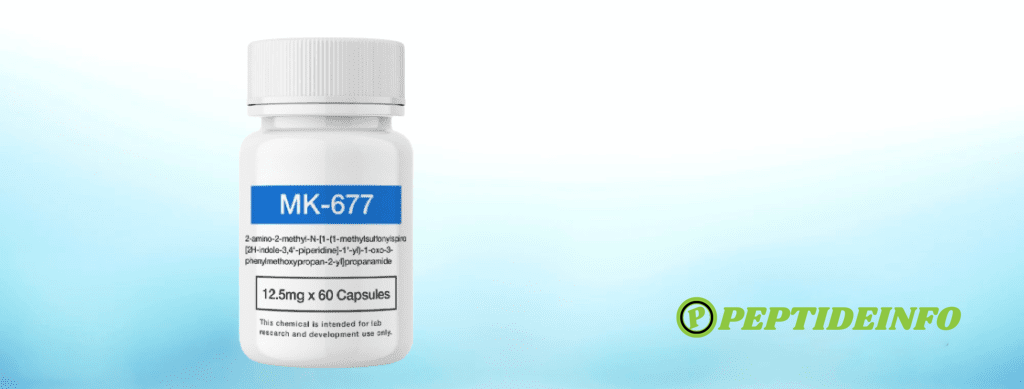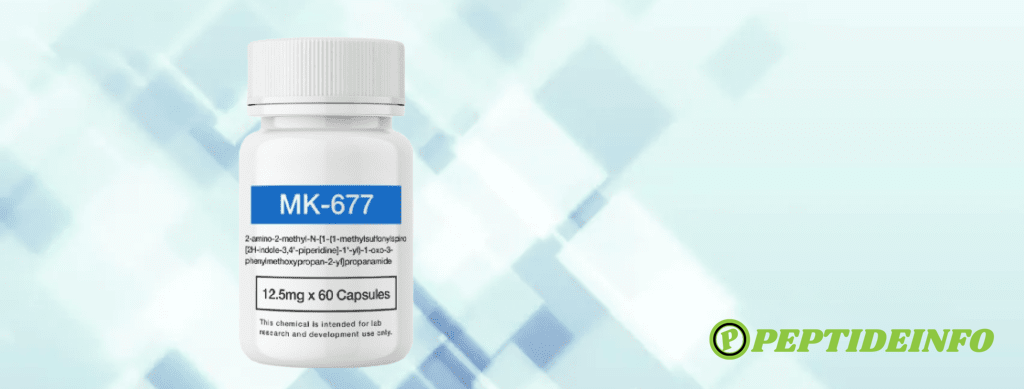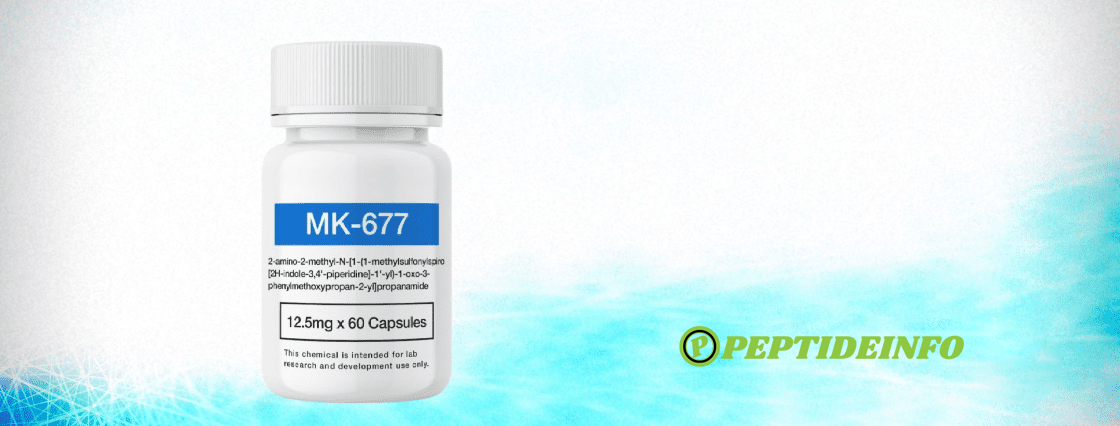What is MK-677?
MK-677, also called Ibutamoren, is a non-peptide research chemical that mimics Ghrelin [1] and stimulates the release of growth hormone (GH) and insulin-like growth factor 1 (IGF-1) [2].
Both GH and IGF-1 play an essential role in a number of bodily processes. They’re used at the cellular level to help cells regenerate and synthesize new tissues [3], and they help the body regulate itself and stay healthy. They also play a strong role in the processes of building muscle, burning fat, and repairing cells [4, 5].
Most people produce sufficient amounts of GH and IGF-1 on their own when they’re young. But production slows down in old age, which is part of the reason that the body doesn’t work as well — it takes longer to heal, it’s harder to build muscle and sleep becomes more difficult [6, 7]. People with a GH deficiency naturally run low on GH from an early age and may suffer from stunted growth and other side effects.
One of the proposed treatments for low GH is to simply supplement it directly with exogenous GH. But it turns out that shocking the system with GH often produces intense side effects and GH research is highly controlled.
Instead, it appears that stimulating the body to secrete its own GH produces fewer adverse effects than traditional GH therapy [8, 9]. One group of substances that can do this is called “growth hormone secretagogues”; they can upregulate the production, secretion, and transmission of GH and IGF-1 throughout the body.
MK-677 is one such GHS that has been consistently found to result in a significant increase in the body’s growth hormone levels.
Let’s look at some of the purported MK-677 benefits.

MK-677 Benefits
Officially, MK-677 is classified by the US FDA as an “investigational drug”. This means that it hasn’t been approved for use in humans and is only available as a research chemical.
However, past research involving MK-677 has shown that its primary effect is that it increases GH levels. This means that it may potentially be beneficial for individuals suffering from GH deficiency or who otherwise have low GH levels. A number of studies have found that MK-677 test subjects subsequently have statistically and clinically significant increases in their blood GH levels [10, 11, 12, 13].
But MK-677 may also offer the following benefits:
- Increased muscle mass. GH has been found to lead to significantly increased muscle mass in several clinical trials [4, 5]. Since MK-677 boosts GH, it’s no wonder that the early research suggests that it, too, leads to significant increases in muscle development in some populations, including obese individuals [13]. It also seems to improve muscle strength and prevent muscle wasting in elderly test subjects [14].
- Fat burning. GH plays an important role in burning fat. While research on MK-677 has not conclusively established its fat-burning potential, some research has found that MK-677 helps increase resting metabolic rate [13].
- Denser bones. Bone fractures from falls are actually among the most common serious injuries for the elderly. Fractures occur because bones tend to lose density with age. MK-677 has been found to help reverse bone mineral loss and lead to denser bones [14, 15, 16].
- Improves sleep. GH has long been associated with better sleep. Research on MK-677 supports that link, finding that the substance improves the length of Stage IV and REM sleep in test subjects [17].
It’s important to note that direct research on MK-677 is still lacking, so these are only potential benefits. So while caution is warranted in interpreting the research literature, the results firmly support the ability of MK-677 to increase GH levels.
We’ll now turn our attention to the question at hand; what MK-677 side effects should researchers know about?
MK-677 Side Effects
We should preface this section by issuing the following caveat: The research is still being done. We don’t know everything. Prescription medications available at pharmacies have undergone very comprehensive (and expensive) clinical testing to determine exactly what the side effects are. That requisite testing has yet to be completed for MK-677.
Still, what we do know appears promising.
There have been several studies of MK-677 involving up to several hundred individuals, including the elderly [10, 11, 15, 16]. In those studies, there have not been any serious adverse effects linked to MK-677.
So that’s good news.
Short-Term, Mild Side Effects
Studies have linked MK-677 to several mild and uncomfortable side effects [10, 11, 15, 16]. It appears that MK-677 can occasionally lead to:
- Flushing of the face (lasting 3 to 5 minutes)
- Increase in appetite
- Headache
- Diarrhea
- Dry skin
- Night sweats
- Numbness and tingling
- Abdominal pain
- Edema
- Muscle pain
Does MK-677 Produce Serious Adverse Reactions?
Those are all fairly mild side effects… but are there more serious side effects?
One particularly worrying side effect is that MK-677 — and GH itself — seems to influence blood glucose and insulin. Several studies have noted decreases in insulin sensitivity and increases in blood glucose as a result of using growth hormone secretagogues [18, 19, 20].
For most healthy test subjects, this may not be an issue. But test subjects who are diabetic, pre-diabetic, or otherwise insulin-sensitive should refrain from participating in research on MK-677.
Another concerning finding was that in one study of elderly patients with hip fractures [14], MK-677 ibutamoren appeared to elevate blood pressure for some individuals. There were even cases of heart failure. It’s not clear that these cases were caused by MK-677 (the patients were all over 80), but this should still be registered as a concerning finding.
Long-Term Side Effects
There have not been many long-term studies of the use of MK-677. So whether there are long-term side effects remains an open question.
The few longer-term MK-677 studies that do exist did not note any long-term side effects. These have studied the use of MK-677 over two years [18] and 18 months [16] respectively.
Still, even though the available evidence suggests that it appears safe over a couple of years, we need to remember that the research isn’t clear yet and so caution is warranted.
Growth Hormone and Cancer?
At this stage, there is absolutely no evidence of any link between MK-677 administration and cancer.
But there have been studies that suggest GH and IGF-1 could promote the growth of cancerous cells [21]. This makes sense: GH promotes cell growth, so it also may promote the growth of cancerous cells, too.
Researchers should bear this with extreme consideration, and refrain from administering all GH secretagogues (MK-677 included) to subjects with any history or significant risk of cancer.
Side Effects are Dose-Dependent
It’s important to note that the side effects of MK-677 appear to be dose-dependent. That means that as the dose increases, the likelihood that the test subject will experience side effects also increases.
That has an important implication for test subject safety: Smaller doses are likely safer.
In general, starting a dosing protocol with a smaller dose, and then increasing it gradually, may decrease the chance of experiencing adverse effects and side effects.
MK-677 Dosage Guide
How have researchers dosed MK-677 for their test subjects in the past?
The specific dose varies from study to study, but the majority of published studies currently use a dosing protocol that is consistent with the following:
- Administered orally. Virtually all MK-677 studies involving human test subjects have administered this research chemical orally.
- Administered once per day. The MK-677 half-life is about 24 hours, so it is usually taken once daily. It can be administered during the day or before bed.
- Most effective on an empty stomach. Many studies administer it 2 hours after eating.
- Between 10 mg and 50 mg. 25 mg seems to be the most common dose for test subjects according to published scientific literature.
MK-677 Research Cycle?
Have test subjects been put on an MK-677 cycle?
There is no published research showing that MK-677 has been dosed in cycles before. Some MK-677 studies have lasted as little as a week, and there is no evidence that test subjects have been exposed to repeated cycles of MK-677.
The longest duration study involving daily MK-677 administration lasted up to 24 months [22]. In this study, MK-677 appeared to be well-tolerated, although it’s not clear what the long-term effects might have been on the test subject involved.
The typical cycle does seem to be 2 to 8 weeks for most short-term research on MK-677, but perhaps longer is also safe. More research is needed to say for sure.

Where to Buy MK-677 Online? | 2024 Edition
Procuring high-quality MK-677 is essential to running a credible study.
The problem is that not all online vendors of MK-677 are trustworthy, and some sell products that are riddled with fillers and impurities.
Fortunately, our team at Peptideinfo.net has already tested all the major suppliers, so we know exactly who to recommend for research-grade MK-677 at fair prices.
Research Peptide
Research Peptideis also head and shoulders above their competition due to their outstanding products and customer care.
Here’s how they stand out:
- True Quality: Research Peptidetakes quality control extremely seriously. They use third-party labs to guarantee the purity of their products and reports are uploaded to the vendor’s website for easy access.
- Perks & Discounts: The vendor offers a 10% discount for first-time subscribers to their informative newsletter, and further discounts for using certain payment methods at checkout.
- Support for Customers: Their customer support is easy to work with, readily available via phone or email and quick to resolve any issues.
Buy research peptides from Research Peptide , a top-rated vendor…
Side Effects of MK-677 | Verdict
Should researchers be concerned about MK-677 side effects?
Overall, researchers should definitely be aware of them. All prudent researchers must seriously consider the potential adverse effects of the substances they work with. This is especially important since there currently isn’t enough research available for us to properly understand all the side effects — especially the long-term side effects — of MK-677.
But so far, the research suggests that MK-677 is generally well-tolerated and rarely leads to serious adverse effects.
Looking to source MK-677? Just click here!


